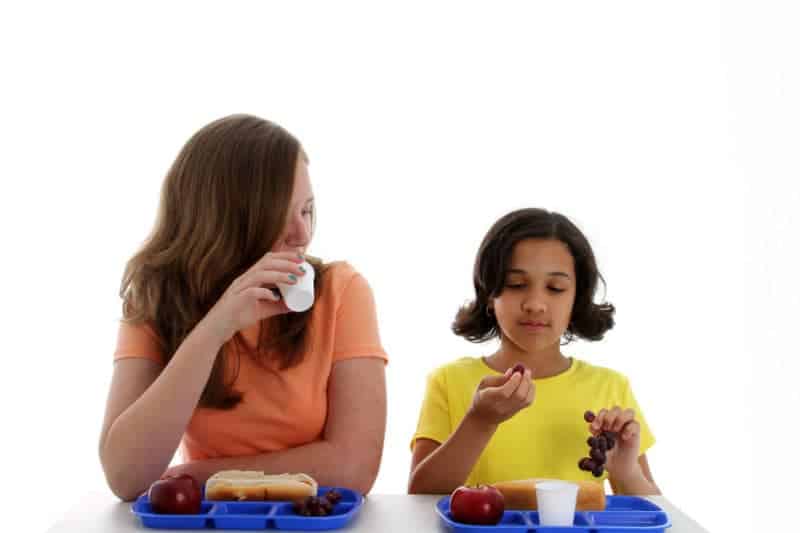Many people laud the school lunch program because it provides food for underprivileged children and a convenient way for busy parents to feed their kids. Sounds good, right? But is this program friend or foe?
In a word: Foe!
While the school lunch in principle sounds like a good idea, it’s decidedly not. Why? Because it’s all processed food. Processed food isn’t just bad, it’s dangerous. It not only undermines children’s health, but it can even bring down their IQ. Yes, your child can become less smart due to eating processed food!
There’s an upside to the problem. The school cafeteria provides an opportunity for our society to improve the health of our youth and the health of the next generation. And the solution is preparing healthy meals using whole foods.
In the United States, the most common health conditions affecting this nation are obesity, heart disease and diabetes. The one common factor among them is that they are all diet related. Scientific studies show that cancer is linked to the metabolic disarray in the body caused by the American diet. The National Institute of Health acknowledges that four of the six leading causes of death in the United States are linked to a bad diet. If you really think about it, diet is the number one factor determining children’s health and it’s completely within our hands to change.
For the first time in history the current generation’s lifespan is expected to be shorter than their parents’ lifespan. This is a shocking and scary revelation. It’s been proven that in many ways this is due to chronic degenerative diseases caused by insulin and leptin resistance, which in turn is the result of a detrimental diet consisting of processed foods.
At least adults can make a choice what they buy to feed their children when they go to the supermarket, while children have no choice at school with the processed, even dangerous, school lunch. They are held captive to whatever is on the menu and you can see that it’s all processed and frozen foods loaded with carbohydrates and sugars.
I come from Eastern Europe. In contrast, schools, daycare, and camps were provided the funds to make children’s meals from scratch. They knew the importance of diet and put resources into the children by making available healthy and hearty lunches to improve children’s functioning and well-being.
Look at how US school lunch compares to what is served in other countries here.
Another study in JAMA Pediatrics published in 2014 shows how over the last 13 years severe obesity rates have increased dramatically: http://archpedi.jamanetwork.com/article.aspx?articleid=1856480. That’s startling and upsetting, particularly for a first world country with the capacity to increase the health of its children.
Even more troubling is that on top of obesity and its disastrous effect on health, a poor diet is proven by studies to make kids less academically capable and competitive. Yes, we are crippling our children from reaching their full potential with poor food choices. Studies literally show a correlation between junk food the kids eat in a week and increasingly lower test scores over the years. It’s a gradual decline, but it’s there.
The solution is quite a simple one. Brown bag your child’s lunch. Choose to give them whole foods and not processed foods. But beware! The word “natural” on a packaged food derivative isn’t necessarily healthy. In fact, in many cases, it’s not.
Here’s an easy way to differentiate between whole, healthy foods and those that contribute negatively to your child’s health. Real food almost always: a) spoils fast, b) is grown, such as vegetables, fruits and legumes, c) requires preparation, and d) has variable quality, color and shape.
Processed food, which is not real in many ways almost always: a) stores forever, b) is convenient to provide because it’s packaged and ready to eat, c) is the same quality, color and shape, and d) is not not grown, but manufactured instead.
As I always emphasize, what you eat is literally the most important factor in the outcome of your health, so pay attention to what your child eats while he or she is in school.
After all, if we don’t have a healthy generation to step up when we fade away, then what do we really have?
So very truly yours,
Dr. Inna

Leave a Reply